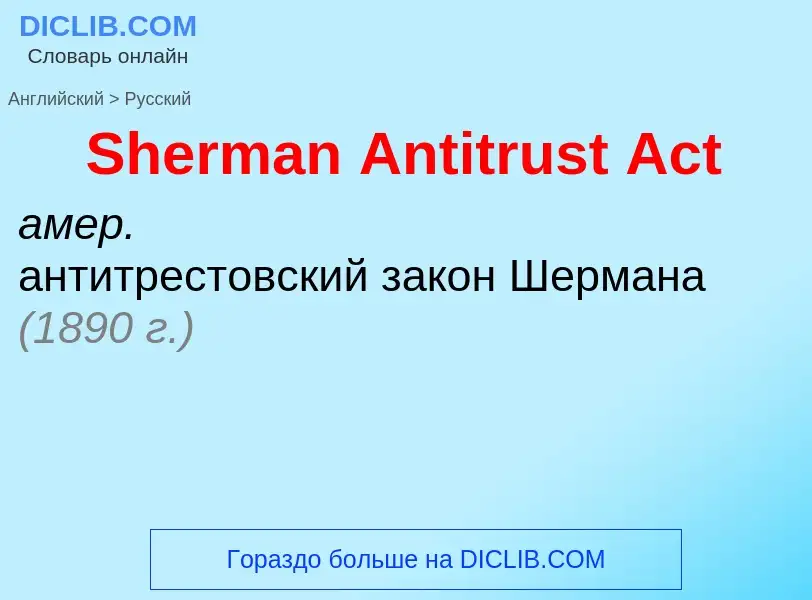Vertaling en analyse van woorden door kunstmatige intelligentie ChatGPT
Op deze pagina kunt u een gedetailleerde analyse krijgen van een woord of zin, geproduceerd met behulp van de beste kunstmatige intelligentietechnologie tot nu toe:
- hoe het woord wordt gebruikt
- gebruiksfrequentie
- het wordt vaker gebruikt in mondelinge of schriftelijke toespraken
- opties voor woordvertaling
- Gebruiksvoorbeelden (meerdere zinnen met vertaling)
- etymologie
Sherman Antitrust Act - vertaling naar russisch
антитрестовский закон Шермана (1890 г.)
закон Клейтона (один из основных антитрестовских законов, 1914 г.)
прилагательное
общая лексика
вводящий, постановляющий
Definitie
Wikipedia
The Sherman Antitrust Act of 1890 (26 Stat. 209, 15 U.S.C. §§ 1–7) is a United States antitrust law which prescribes the rule of free competition among those engaged in commerce. It was passed by Congress and is named for Senator John Sherman, its principal author.
The Sherman Act broadly prohibits 1) anticompetitive agreements and 2) unilateral conduct that monopolizes or attempts to monopolize the relevant market. The Act authorizes the Department of Justice to bring suits to enjoin (i.e. prohibit) conduct violating the Act, and additionally authorizes private parties injured by conduct violating the Act to bring suits for treble damages (i.e. three times as much money in damages as the violation cost them). Over time, the federal courts have developed a body of law under the Sherman Act making certain types of anticompetitive conduct per se illegal, and subjecting other types of conduct to case-by-case analysis regarding whether the conduct unreasonably restrains trade.
The law attempts to prevent the artificial raising of prices by restriction of trade or supply. "Innocent monopoly", or monopoly achieved solely by merit, is legal, but acts by a monopolist to artificially preserve that status, or nefarious dealings to create a monopoly, are not. The purpose of the Sherman Act is not to protect competitors from harm from legitimately successful businesses, nor to prevent businesses from gaining honest profits from consumers, but rather to preserve a competitive marketplace to protect consumers from abuses.

![Ohio]]), the principal author of the Sherman Antitrust Act Ohio]]), the principal author of the Sherman Antitrust Act](https://commons.wikimedia.org/wiki/Special:FilePath/John-Sherman-2.jpg?width=200)
